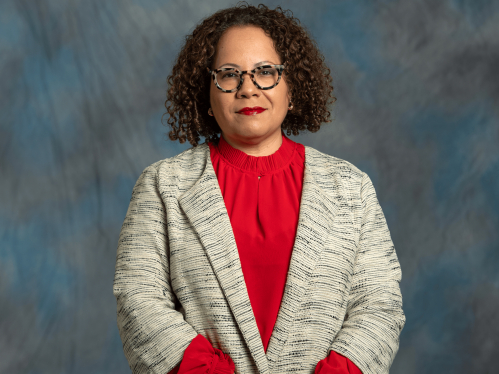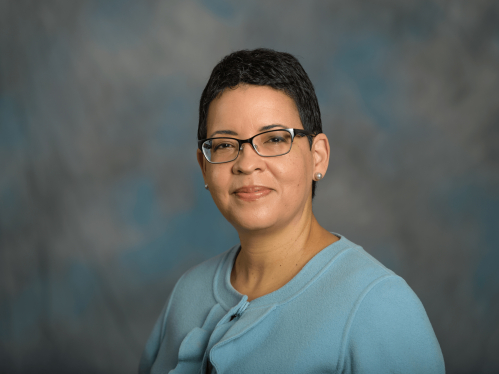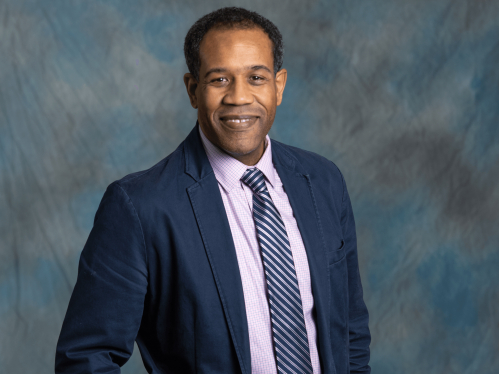
Examining Racism and Inequality to Spark Action
The new Institute for the Study of Global Racial Justice serves as an intellectual corridor that connects scholars and ideas, and amplifies work in the humanities to effect meaningful action and positive change.
It all comes back to how we are thinking about ourselves and others. The need to redefine the concept of being human and move toward global racial justice begins by understanding and addressing the ways we resist recognizing people who live under different circumstances than our own.
Michelle Stephens
Founding Executive Director, Institute for the Study of Global Racial Justice
About the Institute for the Study of Global Racial Justice
With a $15 million Andrew W. Mellon Foundation grant, Rutgers University established the Institute for the Study of Global Racial Justice to provide opportunities for faculty whose work addresses racism and social inequality to collaborate in coordinated ways that lead to meaningful action.
“The nation is at a tipping point with respect to racial and social justice. This grant will enable Rutgers, an institution older than the country itself, to be an international leader in understanding the causes, effects and solutions to problems that have plagued the world,” said Rutgers President Jonathan Holloway.
An intellectual corridor that connects scholars and ideas, the Institute for the Study of Global Racial Justice amplifies work in the humanities to dismantle racism and end systemic inequities. Aligning with the Mellon Foundation’s humanistic orientation, the institute supports the scholarship of researchers who are based in the humanities or lean on humanistic methods and whose work has consequences in areas such as policy reform, K-12 education, social justice work and the carceral state.
The nation is at a tipping point with respect to racial and social justice. This grant will enable Rutgers, an institution older than the country itself, to be an international leader in understanding the causes, effects and solutions to problems that have plagued the world.
Jonathan Holloway
Rutgers President and University Professor
In bringing together scholars from multiple humanities disciplines across Rutgers—from law to language, from philosophy to art, from history to gender studies—the institute serves as an intellectual corridor that escalates the likelihood that their explorations and findings will inform real-world decisions, providing solutions to problems that have been increasingly thrust into sharp focus in the United States and around the globe.
The Institute for the Study of Global Racial Justice will have a universitywide footprint through centers at Rutgers’ campuses in Newark, New Brunswick and Camden. Each center is led by a campus-level director.
“It all comes back to how we are thinking about ourselves and others. The need to redefine the concept of being human and move toward global racial justice begins by understanding and addressing the ways we resist recognizing people who live under different circumstances than our own,” said founding executive director Michelle Stephens, professor of English and Latino and Caribbean studies in the School of Arts and Sciences at Rutgers University-New Brunswick.
Four of the university’s most distinguished academic scholars in civil rights, history, literature, and creative writing have been named directors of campus branches across the university. Reporting to the founding executive director, each campus director is a faculty member who oversees the implementation of the institute's mission at the local level. Directors cultivate and shape humanities-driven programs of excellence that involve a multidisciplinary collection of scholars whose work addresses racism and social inequality.
“Higher education must reveal how racism has been normalized through the historic and current narratives of some of its most under-appreciated citizens,” said Prabhas Moghe, executive vice president of Academic Affairs at Rutgers. “By carefully examining the various forms through which racism continues to invade our culture and all of our institutions, by encouraging conversations and thinking around the lived experiences and policy artifacts of injustice in a variety of dimensions, Rutgers and this new institute together stand poised to establish a unique program of scholarly depth and public impact and will bring unique perspective on how we can strengthen the movement toward resistance and change and ultimately create a less polarized and more just society.”
The Institute, funded through a five-year grant from the Mellon Foundation, will support one-year terms for five postdoctoral scholars engaged in research and writing.
Meet the Institute's Directors
Michelle Stephens
Founding Executive Director
Michelle Stephens joined the Department of English and the Department of Latino and Caribbean Studies at Rutgers University–New Brunswick in spring 2011. She is a psychoanalyst and served as the dean of the humanities in the School of Arts and Sciences from 2017–2020. Originally from Jamaica, West Indies, she graduated from Yale University with a Ph.D. in American studies. She is the author of Black Empire: The Masculine Global Imaginary of Caribbean Intellectuals in the United States, 1914 to 1962 (Duke University Press, 2005) and Skin Acts: Race, Psychoanalysis and The Black Male Performer (Duke University Press, 2014). She has published numerous articles on the intersection of race and psychoanalysis in such journals as JAPA, Contemporary Psychoanalysis, Studies in Gender and Sexuality, and Psychoanalysis of Culture and Society.

Erica Armstrong Dunbar
Institute Campus Director, Rutgers University–New Brunswick
Erica Armstrong Dunbar joined the Department of History at Rutgers University–New Brunswick in 2017. She holds a Ph.D. from Columbia University and specializes in African American, United States, and women’s and gender history, with specialization in late 18th-century and early 19th-century history. She is the national director of the Association of Black Women Historians.

Elise Boddie
Institute Campus Director, Rutgers University–Newark
Elise Boddie joined the Rutgers Law School faculty in 2013. She holds a J.D. from Harvard Law School and a master’s in public policy from the Harvard Kennedy School of Government. An award-winning legal scholar, her work explores the regulation of race in spatial contexts and dynamic systems in law and policy that perpetuate racial inequality. Before joining the Rutgers faculty, Boddie directed the NAACP Legal Defense and Educational Fund, Inc.’s nationwide litigation program. She is also the founder and director of The Inclusion Project, which works to advance racial equity and inclusion in law and policy using multiple tools of research, outreach, community engagement, and media.

Gregory Pardlo
Institute Campus Codirector, Rutgers University–Camden
Gregory Pardo CCAS’99 joined the faculty of the Department of English and Communication at Rutgers University–Camden in 2016. He holds an M.F.A. from New York University and an M.F.A. in nonfiction from Columbia University. In 2015, he won the Pulitzer Prize for Poetry.

Patrick Rosal
Institute Campus Codirector, Rutgers University–Camden
Patrick Rosal joined the faculty of the Department of English and Communication at Rutgers University–Camden in 2011. He holds an M.F.A. from Sarah Lawrence College. In 2018, he was named a National Endowment for the Arts Creative Writing Fellow.






Learn More
Visit the Institute for the Study of Global Racial Justice